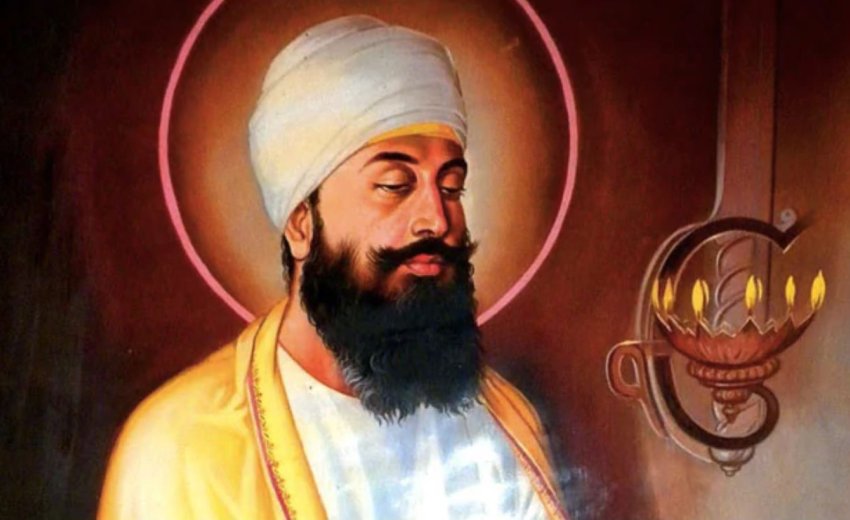In 1675, some notable Hindu leaders asked Guru Tegh Bahadur for help. The Mughal emperor was compelling them to embrace Islam, threatening them with a painful death. Even though Guru Tegh Bahadur followed a different faith, he believed everyone should be free to practice their own religion. The First Amendment (1791) to the U.S. Constitution upholds a similar principle, permitting the free exercise of religion.
Guru Tegh Bahadur told the Hindu leaders to say that they would become Muslim if the Guru did. He also told people of all faiths to stand up against oppression and practice their beliefs without fear. One of his sayings goes like this: Neither frighten anyone, nor be frightened (translated from Siri Guru Granth Sahib).
ਭੈ ਕਾਹੂ ਕਉ ਦੇਤ ਨਹਿ ਨਹਿ ਭੈ ਮਾਨਤ ਆਨ ॥
Bhai Kaahoo Ko Dhaeth Nehi Nehi Bhai Maanath Aan ||
One who does not frighten anyone, and who is not afraid of anyone else
As anticipated, the Guru was arrested.
The Guru and his followers stood strong in their beliefs, even in the face of terrible cruelty. No amount of promises or threats could make them give up their convictions. Sadly, for their loyalty, they suffered greatly. The Sikhs were burnt alive, boiled, and still others sawed alive in front of the Guru. Despite witnessing these horrors, the Guru never wavered.On still refusing to waver from his principle, the Guru himself was martyred.
Gurdwara Rakab Ganj Sahib
Guru Tegh Bahadur's sacrifice holds special meaning as it embodies two important principles of the Sikh faith. One is the belief in supporting not just your own religious practices but also those of others, even if you don't agree with them.The Sikh Gurus, including Guru Tegh Bahadur, followed principles different from Hinduism, emphasizing One Universal God and equality among all people. They opposed the caste system and idol worship, and spoke out against practices like Sati.
Despite these differences, Guru Tegh Bahadur stood up for the right of Hindus to practice their beliefs, even those he didn't agree with. This reflects the Guru's principle of allowing everyone to freely practice their religion, no matter their faith. The Guru's focus was on the journey of consciousness, not just physical rituals. His martyrdom highlights the importance of religious freedom and respect for diverse beliefs in the Sikh tradition.
The Guru's martyrdom teaches a simple yet powerful idea: "No one is an enemy, nor a stranger, I get along with all" (Siri Guru Granth Sahib). Many Mughal rulers like Jahangir, Aurangzeb, Zakria Khan, Yahiya Khan, Mir Manu, and Ahmad Shah Abdali were harsh towards Sikhs, with official bounties on their heads forcing Sikhs into the deep jungles. Hindu leaders like Chandu, Gangu, Sucha Nand, Lakhpat Rai, and Hill Rajas, who had influence with the Mughals, often led brutal attacks against Sikhs, their Gurus, and even young Guru's children. Despite facing this oppression, Sikhs stuck to their clear principles: helping anyone in need. This principle became a guiding light, even in the face of adversity.
Despite facing many attacks from stronger Mughal armies, Sikhs like Bhai Ghanaiya still helped and cared for even those who had attacked them and got injured. When Ahmad Shah Abdali took many Hindu and Muslim girls as war prizes, Sikhs bravely freed them, even though it cost many Sikh lives. These acts of sacrifice were inspired by the teachings of Guru Tegh Bahadur, Guru Arjan, and many other Sikhs. In March 2003, a similar display of kindness and principles was seen from the U.S. Marine Marco Ware. He rescued an injured Iraqi fighter who had just ambushed their supply convoy, showing compassion in the midst of conflict.
The gesture of thanksgiving inspired by Sikhism
In today's world, where hatred divides our communities, this message taught to us by Guru ji ‘everyone deserves the right to live freely’ is more important than ever. The cycle of hate is damaging our society, causing strife in areas like religion, race, class, and politics. When one group acts with hate, it often triggers even stronger hateful responses. This harmful cycle affects various aspects of our lives, creating tension in areas like religion, race, class, national boundaries, political ideology, and economic struggles.
To safeguard our reasons for gratitude, we must break this cycle of hate and vengeance. Love, compassion, and unity are the keys to healing and preserving the things we hold dear. This Thanksgiving, let's strive to stand together, supporting one another and fostering a world where everyone can breathe freely.
Let's take a bigger leap in understanding and supporting people from different faiths. Even if we don't follow the same religious path, it's crucial to respect and protect their freedom to practice. Our lives are filled with blessings, and one significant one is being born with freedom. Yet, true freedom comes when everyone has the basic right to live and breathe freely. Let's embrace this freedom for all.
*Based on an article by Satpal Singh, published in Huffington Post on 25th November 2011
